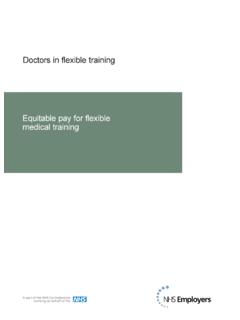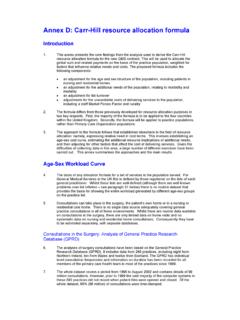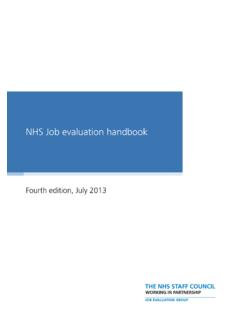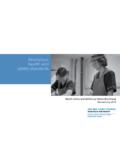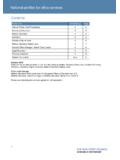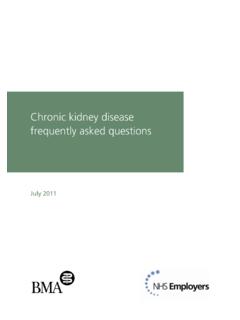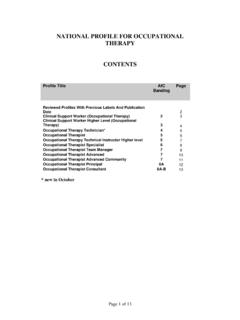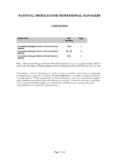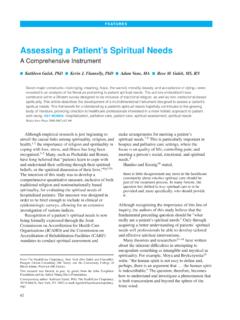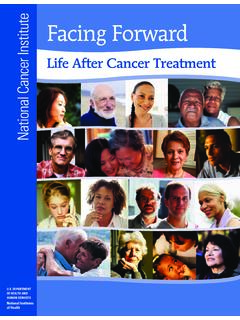Transcription of STAFF EXPERIENCE AND PATIENT OUTCOMES: WHAT DO …
1 STAFF EXPERIENCE AND PATIENT OUTCOMES: WHAT DO WE KNOW?A report commissioned by NHS Employers on behalf of NHS England Author: Dr Jeremy Dawson of Sheffield University Management SchoolJULY 2014 JULY 2014 Following a request from NHS England, NHS Employers commissioned a report from Dr Jeremy Dawson of Sheffield University to look at the international research evidence on the links between STAFF and PATIENT EXPERIENCE . This builds on his previous work as part of the team, led by Professor Mike West, that analysed results of the NHS STAFF survey. It demonstrates the evidence base across a range of studies from the UK and elsewhere, to find that there are clear links between improved STAFF EXPERIENCE and better care for patients .
2 Good HR practice and, in particular STAFF engagement, should therefore be seen as integral to overall objectives for the NHS, not a separate HR initiative. NHS Employers hopes this paper is useful to build the case for good employment practice and as a summary of evidence you have any queries on the issues raised in this paper, please contact of the research studies referred to can be found on the NHS Employers website or on EXPERIENCE and PATIENT satisfaction5 STAFF EXPERIENCE and objective outcome data6 STAFF EXPERIENCE and quality of care7 STAFF EXPERIENCE and other objective outcomes9 Discussion11 Conclusions12 References12 July 2014 3 STAFF EXPERIENCE and PATIENT outcomes: What do we know?
3 INTRODUCTIONFor many years researchers have sought to derive links between the EXPERIENCE of employees within organisations, and the performance of those organisations. Within the healthcare sector, organisational performance usually refers to or at least includes an element of the care of patients . The way in which this is evaluated varies considerably, however, and thus there is little consistency between studies. The competing priorities of healthcare organisations (for example, health outcomes, PATIENT satisfaction, financial performance) can sometimes prevent clear conclusions from research, and may leave healthcare managers and professionals in the dark about what studies have really shown.
4 In this paper we aim to summarise some of the recent evidence about how the EXPERIENCE of STAFF is associated with the quality of care and PATIENT STAFF EXPERIENCE we refer mainly to factors such as STAFF engagement, motivation, satisfaction, morale, work pressure, stress and intention to leave attitudinal or psychological factors that determine how an individual employee feels about their job, their colleagues and their organisation. However, we also include EXPERIENCE of behaviours and management practices at work that would relate closely to this for example, on the negative side this would include experiences of bullying or violence, errors, or discrimination; on the more positive side, however, this can include communication, support from colleagues, job design factors, team working, or EXPERIENCE of particular human resource management (HRM) practices such as STAFF appraisal or training.
5 We only include specific interventions if they are directly aimed at improving the EXPERIENCE of STAFF , and therefore exclude others that focus on a more systemic or clinical change (for example, the redesign of a particular service or the impact of a specific form of clinical training). Neither do we include leadership within our definition of STAFF EXPERIENCE . We note, however, that there is a strong literature on the benefits of good leadership, both within healthcare and elsewhere, and, for example, two reviews of leadership in the nursing context (Cummings et al., 2010; Wong & Cummings, 2007) have demonstrated links between leadership styles and outcomes, such that more transformational and relational leadership styles are often associated with better outcomes, and that positive leadership is associated with increased PATIENT satisfaction and fewer adverse and West (2004) proposed a model explaining how people management practices have psychological consequences for employees (including attitudes such as satisfaction and engagement, and health-related experiences such as burnout and stress)
6 , in turn affecting their behaviour (for example, individual job performance, avoidance of errors, relationships at work, absenteeism and turnover), which then lead to PATIENT outcomes, including improved PATIENT satisfaction and better health outcomes. This model was derived from a large amount of research reviewed by the authors, both within and outside healthcare settings. Although a simplified model in the sense that it doesn t take into account contextual factors that may change these relationships, it provides a useful framework through which subsequent research can be viewed. This model was derived from a large amount of research.
7 JULY 20144 July 2014 STAFF EXPERIENCE and PATIENT outcomes: What do we know?Within the NHS in particular, it can help to explain links between HRM practices and health outcomes (particularly PATIENT mortality) found by West and colleagues (West et al., 2002; West et al., 2006). The importance of STAFF health and wellbeing within the NHS was further revealed by the Boorman Review (Boorman, 2009), which gave further evidence for the links between management practices and employee health; moreover, it demonstrated clear (and often substantial) links between STAFF health and wellbeing and a range of objectively measured outcomes, including absenteeism, turnover, PATIENT satisfaction, PATIENT mortality, and infection rates.
8 This analysis made use of the NHS STAFF survey, which has been run annually in NHS trusts in England since further use of this data was a more in-depth report by West and colleagues in 2011 ( ). This took a more systematic approach to examining the links between experiences of HRM practices (as reported by the NHS STAFF survey), attitudes and behaviours of STAFF , and PATIENT outcomes. It demonstrated that there were significant associations between a number of STAFF EXPERIENCE variables and organisational outcomes; in particular, STAFF engagement (measured in three ways: motivation, involvement and advocacy) was linked to PATIENT satisfaction, PATIENT mortality, and overall performance indicators (from the CQC s Annual Health Check), as well as being very strongly linked with STAFF absenteeism.
9 Overall, they found that PATIENT outcomes were best when there was a climate of respect and dignity, where STAFF were clear about their goals and objectives, and where there were effective people management practices such as appraisals, training and personal development plans. Cultures of engagement, positivity, caring, compassion and respect for all, were important factors associated with good quality of rest of this current document seeks to examine new evidence to have been published since the West et al. (2011) report. We surveyed the literature for studies published in the English language since 2011, which linked employee EXPERIENCE (as defined earlier) with outcomes: this included PATIENT -rated outcomes, as well as objective measures of health outcomes and organisational performance.
10 We included studies that looked at ratings of quality of care provided as the outcome, including those where the ratings were made by the employees themselves. We also included studies that looked at other objective outcomes that were not directly linked with PATIENT care but that have been shown by earlier studies to be linked to PATIENT outcomes (for example, STAFF absenteeism and turnover). We excluded studies where such outcomes were rated by the employees themselves, however (except for when the rating was of the quality of care provided).In the following four sections we summarise the 17 relevant studies that we found.
